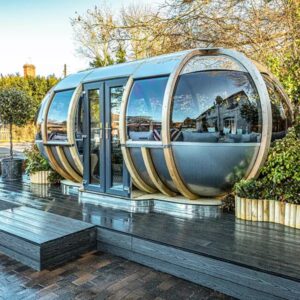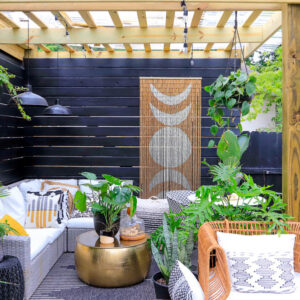:max_bytes(150000):strip_icc():format(webp)/small-space-decorating-2016-2461301_lulie4585-1-390ef6544811402d929735b24cc0c668-a811b7b8f5a346a28a49adc8b0f20f78.jpg)
When it comes to a home, small should not mean claustrophobic. In fact, with a bit of help from thoughtful furnishings, color picks, and organizational tactics, even the quirkiest alcove can evolve into a beloved spot.
There are countless opportunities to take advantage of when short on available space in tiny, often-overlooked areas. Being smart about small space decorating is essential. Joanna Teplin, the cofounder of Nashville’s The Home Edit, says, “When space and storage are limited, it’s easy to feel overwhelmed. By paring things down and utilizing creative solutions, you can really embrace the space you have.” Whether you’re looking to maximize a small closet or learning to live in 600 square feet, we have tricks to help you make the most of decorating small spaces.
Tiny Kitchen With Big Impact
:max_bytes(150000):strip_icc():format(webp)/2587702_brigh180831-ag-amiecorley13959-dog-1-9cd27e2876a643b9a4f1b33ca379f383.jpg)
Walking into Amie Corley’s stunning office, you’d never guess that it was formerly an abandoned caretaker’s apartment in the carriage house alongside her 1907 home. Corley employed a favorite tiny-kitchen trick by covering the appliances with matching cabinet panels. Embracing the comfort, Corley went all-in with her favorite hue, “covering everything in one color actually keeps a small space feeling more open because your eye doesn’t get cut off anywhere,” she says.
A Hip Lounge
:max_bytes(150000):strip_icc():format(webp)/2587702_brigh180831-ag-amiecorley13821-1-68bc0a74cd504e5d9454008bbc3b29af.jpg)
Whether you’re embracing extra space in your attic or basement, low ceilings and awkward window heights can be challenging. Designer Amie Corley created an inviting sitting area in her office for clients and friends alike. In the sitting room, a sofa coordinates with the walls. “Blending big pieces like a sofa into the wall color creates an almost negative space, letting your eyes rest and enabling you to add contrast or pattern elsewhere,” she says.
A Mod Workroom
:max_bytes(150000):strip_icc():format(webp)/2587702_brigh180831-ag-amiecorley14334-1-87f47f8a5a51481e9e28cebde74dfbaa.jpg)
Designer Amie Corley needed her desk area to be a white backdrop for design work. She made it attractive and functional with elegant cabinetry, floating shelves, clutter-taming baskets, and jolts of yellow. Hiding unsightly office necessities helps the room’s appearance while accentuating some decorative yet functional elements to add personality to the space.
A Cozy Little Corner
:max_bytes(150000):strip_icc():format(webp)/2587701_brighandrewhoward_nc_dining_-1-2fb5b151001c4cf891652fdd24960645.jpg)
Add a statement-making banquette to a corner of your living room that a random piece of accent furniture might otherwise occupy. This seating area is a beautiful place for party guests or family members to relax and converse and a spot to sneak in a few layers of color, pattern, and texture. The keys to successfully pulling off this decorating scheme are mixing and matching designs and keeping it cozy.
A Composed Mudroom
:max_bytes(150000):strip_icc():format(webp)/2587702_brighlacy-phillips0135-1-e7a88e4583a44be890c40433e0619f30.jpg)
Lacy Phillips, an interior designer from Pensacola, wanted this entry to serve as a hardworking drop zone for her busy family of five— but the window’s positioning meant that she couldn’t add built-in cabinetry without blocking the natural light. The solution was to purchase a unique shoe bench. It offers storage and rustic charm, while two strips of oversize hooks hold everything from bags to jackets above. Paneled walls painted in a light tone keep the area from feeling cramped or cluttered.
A Happy Kitchen Nook
:max_bytes(150000):strip_icc():format(webp)/2587702_brigh3808southwesternblvd.0017-1-f576a8ee80824edabc0d110745cef3be.jpg)
When redoing this kitchen for a young family in Dallas, interior designer Amy Berry transformed a previously unused window area into a bright breakfast nook with a sunny disposition. She knew she would focus her design on a round pedestal or trestle table. These allow you to squeeze in a few additional people when needed since the centered base prevents awkward straddling of table legs.
New Uses For Big Furniture
:max_bytes(150000):strip_icc():format(webp)/small-space-decorating-2016-2400501_popli4625-0f0c0f6da4f540c89166223910a48983.jpg)
Use your big pieces creatively if you have beloved large furniture but need square footage. For example, store dry goods in a china cabinet to create a pantry in the open. The glass shelving can display some of your favorite home decor items, while the closed shelving below hosts your less presentable items.
Employ A Wheeled Wonder
:max_bytes(150000):strip_icc():format(webp)/small-space-decorating-2016-2400501_popli4282-c6f9bac63953437fa72bb3350787b18a.jpg)
No storage space in your bath? Use a solution on wheels (like this chrome beauty) to store towels and trinkets in style. Movable furniture can be stored away when guests visit to reduce the appearance of clutter. This storage solution can also be a way to organize your items based on what time of the day you use them.
Construct Shoe Shelves
:max_bytes(150000):strip_icc():format(webp)/small-space-decorating-2016-2400501_popli4329-10f97f367b9a4d80ab224df196879b44.jpg)
Shoes littering your space? Try this small space solution: Create a shelving system in your closet beneath the hanging garments for your shoes, bags, and folded sweaters. You can even tuck a small, clean-lined bookshelf into the bottom of the closet to take advantage of vertical space—shelves always do the trick!
Lean On A Book Stack
:max_bytes(150000):strip_icc():format(webp)/small-space-decorating-2016-2400501_popli4558-1-7e082d0bfd4a4da198cf2150eb13b307.jpg)
Small spaces rarely have room for a big shelf, but they can look messy if you need somewhere to display your favorite books. Avoid this problem by stacking books vertically in one corner of the room. You’ll add a bit of shelf space in the process once your items reach a suitable height.
Add Hybrid Seating
:max_bytes(150000):strip_icc():format(webp)/small-space-decorating-2016-2400501_popli4593-f41fa05025424c1299e20ac507616d26.jpg)
Tiny kitchens need seating space too. Grab a stool to offer additional seating, but make it work double duty. You can set a tray on top, fill it with your favorite liquors, and accommodate guests with your new corner bar stool.
Extend Your Mantel
:max_bytes(150000):strip_icc():format(webp)/small-space-decorating-2016-2400501_popli4532-4b8ee503ec3f4c4da08d93e71d1d5717.jpg)
In a small space, every inch of shelf space is valuable. Add two-tiered shelving to the top of your mantel with a shelf fastened to the wall. It provides a seamless addition of display space.
Define Zones With Rugs
:max_bytes(150000):strip_icc():format(webp)/small-space-decorating-2016-2400501_popli4452-caae8ccc46a84a5ea66b27d92f2de01f.jpg)
Define each area of your space—especially if you have a studio apartment. Rugs help create zones and define each nook instead of giving the impression of one blurred, combined room. When space is limited, every room must serve a function.
Old Objects In New Ways
:max_bytes(150000):strip_icc():format(webp)/small-space-decorating-2016-2433501_south24690_sdw-copy-8d266347d05f40f88aaf7fd96130262b.jpg)
Find creative ways to use objects that you already have. A gorgeous set of antique champagne buckets? Attach them to the wall and use them for flatware storage, as planters for flowers, or as graphic art. When in doubt, go vertical and take advantage of wall space in small rooms.
Go Bold
:max_bytes(150000):strip_icc():format(webp)/small-space-decorating-2016-2427001_richm15603_0-2000-79ef21aafc4e4e3f96e9d85b5d4e63d1.jpg)
Feel free to go big and bold with patterns in small spaces. Add touches of personality by mixing designs on beds, framed photos, and vibrant wallpaper. Incorporate serene neutrals for a grounding base to accentuate your joyful accents.
Adorn Simply
:max_bytes(150000):strip_icc():format(webp)/small-space-decorating-2016-2445301_beste_022-1-e25bcb3b91384550affa1c87446a4142.jpg)
Don’t crowd small spaces, like this open-air porch, with furniture and plants. Use well-chosen, sculptural details, like these planters flanking the porch doors. The vertical design adds visual interest without overpowering the floor space. A tiny planter by the front door adds just enough charm for this compact facade.
Avoid Bathroom Clutter
:max_bytes(150000):strip_icc():format(webp)/small-space-decorating-2016-2445201_bestntuscaloosa10-1-195866974b594e3b873c5137a12c1ff5.jpg)
In a space like this small bath, embrace simplicity with one big focal like this stunning tub. Bare white walls give the illusion of more space. Adding one large piece of landscape art maintains the clean-lined, spacious, and elegant room vibe and adds color, depth, and interest.
Embrace Banquette Seating
:max_bytes(150000):strip_icc():format(webp)/small-space-decorating-2016-2427001_richm16087_0-2000-679b390a5fb742688d8814af8f9ce00f.jpg)
A banquette can be an excellent go-to for flexible seating in a small space. Chairs can move throughout the room, but many people—kids, friends, family—can crowd onto a banquette for breakfasts, homework, and game nights. Positioning this table area by a window adds an extra aspect of openness to the room by incorporating natural light.
Carefully Curate Tabletops
:max_bytes(150000):strip_icc():format(webp)/small-space-decorating-2016-2427001_richm15870-1-07b1a356a9744cde8887272d2a6dc7c0.jpg)
Clutter is your enemy when you are styling a tabletop. Especially in a foyer, keep things simple with a few well-chosen lamps, frames, and beautiful objects. Add hooks or built-in shelves to prevent someone from tripping on a mess, especially in a high-foot-traffic hallway.
Play With Symmetry
:max_bytes(150000):strip_icc():format(webp)/small-space-decorating-2016-2427001_richm15439-1-fef4e0e1e89f4322adac1c84e8b72cfb.jpg)
In a cozy family room, oversized sofas can be perfect for movie nights, reading hours, and long afternoon naps. If you don’t have much room to move, fill a small space with comfy, symmetrical seating. Big sofas that mirror each other create an eye-pleasing design that keeps the area clean and not crowded. It will become everyone’s favorite nook.
Shrink Your Favorites
:max_bytes(150000):strip_icc():format(webp)/small-space-decorating-2016-2427001_richm16388-1-8c66434e5402465eb8db842c6c2c64e8.jpg)
If you have a small space to fill, look to small-scale versions of your favorite pieces, like the loveseat version of a beautiful sofa or a side table version of a pretty coffee table. It will fill the space with style, only smaller. Make this unique item the focal point of your decorating plan.
Cultivate Container Style
:max_bytes(150000):strip_icc():format(webp)/small-space-decorating-2016-2424601_conta_0040-1-b87d8b4265d7433ba0842c1b407cf40f.jpg)
Who has room for all those pots and planters? Combine your favorite floral styles in one compact planter for a maximum garden impact that takes up much less space. It’s perfect for a small porch or patio. You can also choose a hanging basket eliminating the need for floor space.
Add Color With Flowers
:max_bytes(150000):strip_icc():format(webp)/small-space-decorating-2016-2424601_conta_0094-1-1b0e8729b32f45b29ea5efbca36484e3.jpg)
For design in small spaces, flowers work wonders. You can always change the colors and styles, but vases, small planters, and window boxes are invigorated with arrangement changes. Flowers are also great for displaying holiday themes without wasting valuable space.
Keep Clutter To A Minimum
:max_bytes(150000):strip_icc():format(webp)/small-space-decorating-2016-2464001_chriscc0015_nadianejaime_0004-1-29136a91f0f7439db58e5f2fe49bdd68.jpg)
Nothing makes a kitchen feel smaller than a countertop filled with bowls, utensils, and cookbooks—in a word: clutter. Keep spaces bright, airy, and clean using shelving and in-drawer storage solutions. Consolidate where you can by donating doubles of items you rarely use.
Use Nook And Cranny Space
:max_bytes(150000):strip_icc():format(webp)/small-space-decorating-2016-2464001_chriscc0015_nadianejaime_0006-092acd60b4954af78ced74474dd1eea4.jpg)
In a small area, every corner should be well-spent. This nook offers efficient use of space by adding a refrigerator for drinks, shelving for storing glasses, and a marble-topped counter in a small bar. It adds party and prep space to a small kitchen. Make use of cabinets to store excess cocktail mixes and containers.
Decorate Your Walls
:max_bytes(150000):strip_icc():format(webp)/small-space-decorating-2016-2424601_conta_0169-1-abde8f4c4cb14df4af0096fa0f51d169.jpg)
Take advantage of empty wall space with creative wall art. Fill a vintage basket with flowers, add art, or hang pretty graphic objects for decor that doesn’t intrude on your square footage. Transform unique decor into a focal point by converting it into a wall hanging.
Design For Real Life
:max_bytes(150000):strip_icc():format(webp)/small-space-decorating-2016-2464001_chriscc0015_nadianejaime_0064-1-919c2de3537146c09110fea190a33387.jpg)
Who uses the space? There’s limited square footage, so make it work for you, your family, and your pet’s needs by thinking through your daily routines. A clever, hidden door opens to a cozy bed for a sweet pup in this kitchen. It saves space since there is no need for a kennel.
Go For Brights
:max_bytes(150000):strip_icc():format(webp)/small-space-decorating-2016-2467601_louis0918-1-d53ec708fc424b6e968de056cb0abf44.jpg)
In a small area, like this tiny guest bath, bold wallpaper and bright accents lend a lively and airy vibe to the enclosed, windowless room. When natural light is not an option, add overhead lighting to mimic the sun and illuminate the space. Light will reflect off your pops of color and help them shine.
Insert A Breakfast Nook
:max_bytes(150000):strip_icc():format(webp)/small-space-decorating-2016-2467601_louis1178_0-2000-27392ef47b3c4c8481f5448cdb0a91a4.jpg)
Even the smallest rooms add real impact. Breakfast nooks are useful—making everything from breakfast to homework to game nights a little easier. Find a way to carve out the space for this multi-purpose space in your tiny home (with just a few chairs or a complete banquette), and you’ll never look back.
Play With Recessed Spaces
:max_bytes(150000):strip_icc():format(webp)/small-space-decorating-2016-2461301_lulie4585-1-390ef6544811402d929735b24cc0c668.jpg)
Have any awkward recessed nooks in your small studio? Crannies with no real purpose? If you can find just the right size of desk or dresser, try tucking your furniture into the area for the ultimate storage solution. Other alternatives include using the small corner for storage, so there’s no waste of space.
Fashion Multi-Purpose Rooms
:max_bytes(150000):strip_icc():format(webp)/small-spae-decorating-2016-2461301_lulie4016-d24b38fd56434735bd297708081de1ba.jpg)
This home was a two-bedroom with a considerable need for more living space. Turquoise walls revamp the second bedroom containing a queen-size daybed to create a multi-purpose den that can easily convert into a guest bedroom. Natural light makes it an ideal space for work, and the sweeping drapes help prepare it for someone to sleep.
Select Multi-Use Furniture
:max_bytes(150000):strip_icc():format(webp)/small-space-decorating-2016-2461301_lulie4720-1-d9f2ad3c5bd74eefb26bd004bce0e0b1.jpg)
A daybed works wonders in a small space. It can function as both a sofa and bed, adding increased flexibility and functionality to a studio apartment, guest room, or living room. This queen bed-daybed hybrid was created by affixing two headboards to a mattress base.
Stack And Lean Art
:max_bytes(150000):strip_icc():format(webp)/small-space-decorating-2016-2461301_lulie4417-1-22d1917a97de4b888f265bc131b576e7.jpg)
Need more room to hang art on the walls? Stack it on the mantel and lean it against the walls. It adds instant style and a casual, mix-and-matched vibe. If there is more art than wall space, create mini-galleries throughout the house and branch out—art isn’t just for walls anymore.
Add A Touch Of Green
:max_bytes(150000):strip_icc():format(webp)/small-space-decorating-2016-2481401_digin_055_sdw-1-5341b8164c5e480caa407e6582bd3794.jpg)
Are you desperate for some green in your space but have no room for pots and planters? Tuck a fiddleleaf fig in the corner or line up tiny pots of succulents on a windowsill. The fiddleleaf fig will thrive in bright light and regular water, and the succulents require very little attention. Voila!
Entertain Alfresco
:max_bytes(150000):strip_icc():format(webp)/small-space-decorating-2016-2461301_lulie3862-1-9cb774306b054addb2147d23de9d0bc1.jpg)
No space for entertaining inside? Move outdoors and establish entertaining in your backyard or garden. The whole yard can be your living room if the weather cooperates. There’s no need for cramped cocktail hours inside when you can set up tables and chairs under the stars.
Seek Space-Saving Elements
:max_bytes(150000):strip_icc():format(webp)/small-space-decorating-2016-2447901_janie00014-1-c575447531a949c4b625b8068a58387d.jpg)
Space-saving pieces with thoughtful features, like the elements in this bath, make the most of a tight space. A single sconce and perfectly proportioned drawers (plus custom under-sink storage) ensure a streamlined and orderly area free from clutter. Try refurbishing an old piece of furniture you don’t have the space for but can’t seem to throw out.
Invest In Sconces
:max_bytes(150000):strip_icc():format(webp)/small-space-decorating-2016-2447901_janie00060-1-25555f47684d417bbded2884f32eacea.jpg)
No room for tabletop lamps? No extra square footage for a floor lamp? Then sconces are the way to go. They add ambiance, illumination, and functional style without occupying valuable floor space.
Keep Cabinetry Streamlined
:max_bytes(150000):strip_icc():format(webp)/small-space-decorating-2016-2438001_linds26845-1-9d50da53ea334711add2ae18b0ccfe1c.jpg)
Hide clutter with streamlined, minimalist-inspired cabinetry. This small kitchen maintains visual consistency by mirroring the style of the cabinets and bar. The glossy white hue keeps things light and airy too. A bar or island is also a great place to incorporate seamless storage—if you can, add drawers for all your tools and a place for a trash can. An island with storage keeps everything hidden and the countertops looking clean, but the kitchen remains completely functional.
Optimize Ottomans
:max_bytes(150000):strip_icc():format(webp)/small-space-decorating-2016-2438001_linds26769-1-c30b745fa6244619a9f7df9c213c41f2.jpg)
Use a pair of ottomans to create a clever coffee table that doubles as additional seating. By setting a tray on top of the fabric ottoman, you add a sturdy place to put a cup of coffee or style an array of books and beautiful objects. Remove the tray to offer more seating when entertaining or want to rest your legs.
Incorporate Substantial Storage
:max_bytes(150000):strip_icc():format(webp)/small-space-decorating-2016-2438001_linds26718-1-37191f4d6bb547fb906bb5210aa2b957.jpg)
While tossing a basket under an open sink may be tempting for impromptu storage, adding permanent storage can be a better—and more attractive—option. A hefty, enclosed series of drawers and cabinets make a real impact while hiding all the clutter bound to accumulate. Permanent fixtures add sophistication to the space, no matter the room’s size.
Embrace Close Quarters
:max_bytes(150000):strip_icc():format(webp)/small-space-decorating-2016-2406501_carlt6340-7b81d16b0fb14cf68b0f3f0b79509101.jpg)
When small spaces require multiple functions like this dining and living room, cluster the furniture to create defined areas. Instead of a sectional, add a sofa and loveseat next to a small table in an open corner. Like puzzle pieces, well-chosen furniture elements can fit together seamlessly without feeling cramped or cluttered.
Paint Walls White
:max_bytes(150000):strip_icc():format(webp)/small-space-decorating-2016-2436301_potom00041-1-e2810f8d77f946abbf9c07f8aa3484de.jpg)
It’s quintessential small-space advice: Paint your walls white. And it’s a classic tip for a reason. White walls add an airy lightness that makes any small room feel more spacious.
Add Unexpected Vibrancy
:max_bytes(150000):strip_icc():format(webp)/small-space-decorating-2016-2436301_potom00032-1-7874a132c52348f080a49646d61dcac5.jpg)
White walls can work wonders, but in a small space with many windows, add a vibrant color that draws the eye in (or perhaps up) and interacts playfully with colors both in and outside. Include rich colors in pillows or art, but for a bold addition, paint the ceiling. This ceiling adorned in a deep, saturated emerald hue is a nod to its waterside setting and a gorgeous design element for this small living area.
Rugs Create Cohesion
:max_bytes(150000):strip_icc():format(webp)/small-space-decorating-2016-2477201_matth38067-1-5e1161f9c53243e9aaaba5a0be0f9056.jpg)
When you have a variety of pieces you love in a small space, embrace the vivacity the mix creates, but use a neutral rug to tie it all together. A subdued pattern or combination of colors and textures can unite the space. Even the most eclectic rooms need a grounding base—a rug can offer that stability.
Make It Work For You
:max_bytes(150000):strip_icc():format(webp)/small-space-decorating-2016-2477201_matth38113-1-2c862cc8c0834d3fb390a4206b49f5c7.jpg)
If any architectural or design elements don’t fit your lifestyle, change them and make them work for you. The designer covered the front of the fireplace with antiqued mirrors, adding interest and making the formerly boarded-up hearth a welcome sight, not an eyesore. Instead of leaving it open to access, the designer placed matching chairs in front of the fireplace. There’s no need to access the area, so seating works perfectly here—and looks great when reflected in the fireplace’s new, mirrored design.
Think Outside The Cabinet
:max_bytes(150000):strip_icc():format(webp)/small-space-decorating-2016-2477201_matth38185-1-ad534402f8394734b26557a1105a1c6b.jpg)
Need more room for a complete set of kitchen cabinetry? Try using freestanding pieces, like this antique case that can be hung and repurposed as over-the-sink storage. It’s inspired.
Go Wild For Wallpaper
:max_bytes(150000):strip_icc():format(webp)/small-space-decorating-2016-2449601_sarah44183-1-4ec66c00daed49f2aae6bb9abd07ae41.jpg)
Tiny spaces are perfect for branching out and trying bold wallpapers and paint colors. The vibrant wallpaper in this small bathroom packs just enough punch. Offset by white fixtures, this color makes a statement.
Maximize In-Between Areas
:max_bytes(150000):strip_icc():format(webp)/small-space-decorating-2016-2436101_bohic23205-1-1e4e909a1bc54e36aa316a1752ef91e4.jpg)
The owners enclosed an upstairs balcony in this space to form a second-floor study. Instead of a landing only used for passing through, the room is perfect for lounging or hosting guests who can sleep on the room’s foldout sofa. The darkly painted wainscoting paneling adds depth to the room.
Style With Accessories
:max_bytes(150000):strip_icc():format(webp)/small-space-decorating-2016-2447801_barri28972-1-09df5a0577314312914fa9ef3f4d0444.jpg)
Your space should evolve with you, but buying new furniture to fit your room or mood might be challenging (or not within the budget). Change the pillows and accents to update a space without investing too much in the design. Mix and match colors and patterns to create a new room in a snap.
Flex Your Furniture
:max_bytes(150000):strip_icc():format(webp)/small-space-decorating-2016-2447801_barri28308-1-f014a6d5222a4705a79d9737ccd93de7.jpg)
If you have limited space but also have a big family or many regular guests, focus on the flexibility of the pieces, colors, and design elements you already have. This family created a bunkroom by lining up four Jenny Lind beds painted in bright red. It’s a maximized space that is also flexible—it’s great for kids and guests alike, and the configuration can change on a dime.
Open Up The Floor Plan
:max_bytes(150000):strip_icc():format(webp)/small-space-decorating-2016-2436101_bohic23323-1-ddfd4abe53d44b4b99ba6e7db1dce072.jpg)
This cramped kitchen doubled in size when the owners removed the wall separating the breakfast room and kitchen. The open floor plan makes the whole area feel more spacious. An open floor plan makes entertaining easy since you can host many people in one space without feeling like you’re excluding anyone.
Keep Bedsides Simple
:max_bytes(150000):strip_icc():format(webp)/small-space-decorating-2016-2447801_barri28921-1-0851d018be5f4c28b935990618599b95.jpg)
The bedside table corner is one place in the house that can become very cluttered. Use a tiny table with a substantial drawer to store and hide unwanted clutter, and style the tabletop with a simple lamp and carefully chosen design elements to keep things simple—and peaceful. Tables with multiple drawers can help reduce the visible chaos.
Brighten With Benches
:max_bytes(150000):strip_icc():format(webp)/small-space-decorating-2016-2447801_barri28530-1-9bfdac6ac1a946c4bb7b722d91a477d6.jpg)
This small foyer doesn’t have room for a big desk or other substantial furniture, so this small, brightly painted bench works wonders. It adds a pop of color to a neutral, dark space and provides a perfect perch for groceries or bags. Make the most of in-between spaces, and remember how you use the room—design for function and real life.
Avoid Stumbling Blocks
:max_bytes(150000):strip_icc():format(webp)/small-space-decorating-2016-2442701_james33564-1-574e07dd2002483e8c3888a0fcfa5b09.jpg)
Feel free to do without typical design features in a narrow space like this living room if they don’t work in the area. This room doesn’t try to squeeze a coffee table between the parallel sofas. It allows the seating to flank the room’s focal point, the gorgeous fireplace, and leaves plenty of legroom between the couches.
Design Customizable Elements
:max_bytes(150000):strip_icc():format(webp)/small-space-decorating-2016-2500001_danaw49232-1-7c034da2946c4d8a83cddf5dccd65ccd.jpg)
This birch-bark cardholder is used for Christmas cards in December but can be customized with photos and keepsakes all year. Incorporate simple, flexible elements (like photo displays) into your space so that you can update them—and guests can fawn over them. Like this birch-bark cardholder, a beautiful feature can also stand independently without additions.
Create An Eat-In Kitchen
:max_bytes(150000):strip_icc():format(webp)/small-space-decorating-2016-2461301_lulie4110-1-a63431b4f4084e9bb342ca89f1e461c5.jpg)
If you don’t have a dining room—or if you decided to turn the dining room into a living room and now need a place to eat—try tucking a table and chairs into the kitchen. Creating an eat-in kitchen is easy, even if you are tight on space. Try a foldout bistro table and two chairs for a tiny room or a banquette and substantial breakfast table for an area with more freedom to move.
Sneak In Smart Storage
:max_bytes(150000):strip_icc():format(webp)/2644601_IdeaH-_67w-2000-8976f56f20af49f6bb70beff9168f973.jpg)
Add storage wherever you can think of when renovating. “If you have the space to create a corner nook like this, get a carpenter to put the seating on piano hinges and use that hidden storage for appliances that aren’t needed often,” recommends New Orleans professional organizer Tami Hills. This unique solution will reduce the clutter seen by visitors and add functionality to a small space.
Fend Off Clutter
:max_bytes(150000):strip_icc():format(webp)/Rothstein3DrawerWoodStorageBench-04cc081b17f2415281eec14cb5d2844e.jpg)
Colorful pillows coordinate with the vintage rug and serve a second purpose—to discourage dropping any personal items on the bench. “Small spaces must be well organized: Bags go on hooks, shoes are put in slots, etc.,” Phillips says. “We do our best to keep it clean and clear to allow room to sit and to make things look tidy.”
Open Things Up
:max_bytes(150000):strip_icc():format(webp)/2612001_galme_0597_0-2000-2a75bad7f6e741af8bf45e4323222c0f.jpg)
Roman shades allow light to stream through rooms, making them excellent options for window coverings. Any window treatments, such as drapes, can elongate a viewer’s perspective of the room and brighten it when attached to the wall. Opening up areas to natural light freshens even a tiny space.





